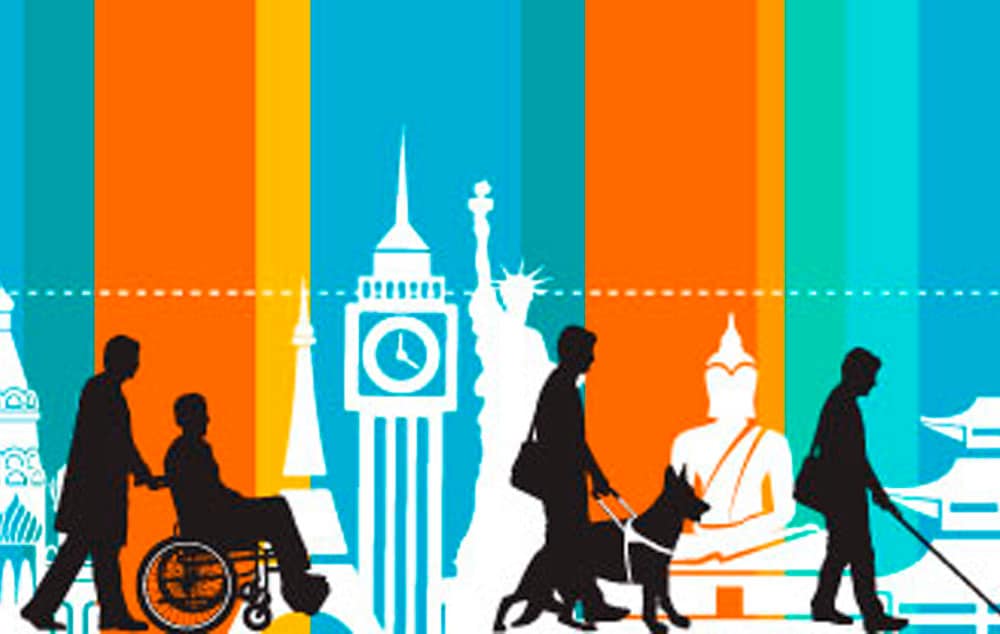While the concept of accessible tourism for senior and disabled tourists has emerged in various parts of the world, the needs of this niche market remain unaddressed and under-served in Asia despite its strong potential to contribute to tourist arrivals and revenue.
The World Health Organisation Report 2011 estimates that 15 per cent of the world’s population has a disability and more than one billion people with special needs worldwide, of which an estimated 80 per cent live in developing countries.
According to HelpAge International, by 2050, nearly one in five people in developing countries will be over 60. United Nations Economic and Social Commission for Asia and the Pacific projects that Japan, South Korea, Singapore, China and Thailand will become the five leading countries in Asia with an ageing population of 60 years and above in 2050.
The Asia-Pacific Network on Accessible Tourism (APNAT), which is headquartered in Malaysia and currently in the process of being registered as an association, will soon see the establishment of country chapters to champion barrier-free travel for people with disabilities in the region.
Sia Siew Chin, pro tem committee chairman of APNAT, said: “Through APNAT, we would like to be able to reach out to governments, people in the tourism industry and service providers to provide for the access needs of everyone in society, in particular people with disabilities.”
Advocating that the creation of barrier-free travel can improve a country’s tourism competitiveness, Joseph Kwan, global chair, International Commission on Technology & Accessibility, Rehabilitation International and advisor to APNAT, said: “Making changes need not be too costly. When transportation such as old buses and cars need replacement, transport providers can look at buying vehicles that are user-friendly and accessible to the elderly and people with disabilities, thus increasing ridership and in turn, revenue.
“Costs in making appropriate changes to building structures and facilities that are accessible to all can be reduced by getting advice from specialist access architects and from organisations dealing with people with disability.”
Several enterprising travel organisations in the region have already identified the market as ripe for picking.
For Antony Leopold, managing director of Kuala Lumpur-based Ace Altair Travels – which caters to the special needs of disabled travellers from the point of arrival to the point of departure – his interest in providing such travel services is a personal one, as he suffers from polio.
Leopold said: “We ventured into this segment in 2013 when we fitted our new van with a hydraulic wheelchair lift. That year, we had three physically challenged clients. In 2014, we had 26 clients, ranging from families with a member needing a wheelchair, to couples and friends with special needs travelling together.
“(This) year, we will fit another van with two hydraulic wheelchair lifts as we get many requests from people travelling in pairs,” he added.
Ace Altair Travels’ services include providing trained personnel; recommending disabled-friendly hotels, restaurants and attractions; and offering special equipment such as wheelchairs, ramps, shower chairs and portable commode.
“There are different levels of disability,” stressed Leopold. “Once we get a request from a client, we will first have to find out what is the level of their disability, what they are able to do and not do. If the person requires a wheelchair, we will find out the size and whether they want a motorised one or not.”
Leopold also drew attention to the state of disrepair of sidewalks and high curbs in Malaysia, where wheelchair users frequently find their path of travel obstructed by poorly designed narrow sidewalks, parked cars, motorcycles, fences, stairs and trees, reflecting an accessibility issue that is repeated across other South-east Asian cities from Bangkok to Jakarta.
“In many areas of the city, it is virtually impossible to travel without an assistant,” he added. “We hope our effort will make accessible tourism a reality in Malaysia, which presents a great challenge for travellers with mobility impairments.”
In Singapore, want2travel (www.want2travel.com.sg) was started by Patrick Ang, a paraplegic, in July 2012 to encourage families to involve disabled or elderly members with mobility issues in their travel plans instead of leaving them behind.
He said: “There is a lot of additional work when it comes to providing travel services for the disabled. For example, we will find out the extent of the disability and then try and match accommodation and services to suit the client’s needs.
“Many hotels claim they are disabled friendly because they may have ramps leading to the entrance, but the disabled room may not have a toilet that is disabled friendly (with) handrails or enough space to manoeuvre a wheelchair, thus we do a thorough check first before recommending a hotel or providing advice to a client.”
Non-profit organisations are also keen to make tourist sites more accessible.
With an aim to make the state’s Sungai Liam Waterfall in Ulu Yam accessible to all, the Waterfall Lovers Association of Selangor is raising funds through corporate sponsorship to build parking areas for the disabled, ramps linking the parking area to the waterfalls, disabled-friendly toilets and special wheelchairs for use in water.
This ambitious project, scheduled to be completed in 1H2015, will be replicated at other waterfalls too, said Mohd Ridzuan Gunasegaran Abdullah, secretary general of the association.
Elsewhere in the country, National Council for the Blind Malaysia will join hands with George Town World Heritage to develop a three-hour audio descriptive guided walk around the UNESCO World Heritage site of George Town in Penang, catering to the visually impaired. The trail is targeted to be launched in July.
Meanwhile, the Taiwan Access For All Association had recently developed a mobile app for inclusion and assistance for disabled and senior travellers. The app provides a listing and photographs of accessible restaurants, tourist sites and hotels, and users can also share their experiences on accessibility. There are plans in future to develop this site in English, according to the association’s secretary-general, Jacky Hsu.
Source: TTG Asia



